It looks like you're using an Ad Blocker.
Please white-list or disable AboveTopSecret.com in your ad-blocking tool.
Thank you.
Some features of ATS will be disabled while you continue to use an ad-blocker.
8
share:
Today, i want to share with you a story, about a man and a woman, who, along with like-minded people they had met on their way, followed a vision, a
calling if you will, to give life back to a place where it had almost vanished. Their believe, that in order to heal, one needs to act from compassion
and their determination to pursue that dream, led them on this incredible journey and enabled them to create, what they call Djanan, a paradise.
Djanan 2003
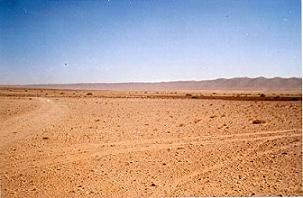
Djanan 2009
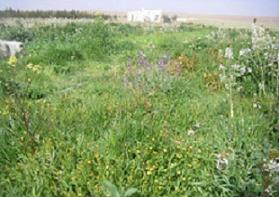
This thread will probably soon disappear into the void, but let it be an inspiration for the brief moment you're reading and hopefully, enjoying it.
"Be like salad, carry your heart in your head." - Madjid Abdellaziz
How it begins:
Madjid Abdellaziz, born in Algeria, had studied informatics in the 1980s at the Technical University in Berlin/Germany. After he graduated, he worked for Volkswagen as a project manager and programmer.
Being quite successful in Germany, he still had strong ties to his home country.
Shortly before the civil war in Algeria in 1992, he got in contact with a Tuareg Leader, they developed a close relationship and eventually became friends. To help him survive the violent conflicts, he managed to bring him and members of the tuareg tribe to the international tourism fair in Berlin.
After they had returned to Algeria, with the support of both goverments, german institutions organized an expedition to the algerian northern sahara.
It was there, where the defining moment took place, that ultimately changed the course of Madjids life.
The Helicopter, transporting the members of the expedition, crashed during a stop in the desert.
Because Madjid had decided to stay behind to clean up the camp, he hadn't been on the flight.
All occupants died, including the pilot's children.
Madjid, being the only surviver, started to seek for a way to show his gratitude for the life that had been granted to him.
He felt, this experience had given him the obligation to give life back to the desert and to the people living there.
Getting in touch:
In the following years he got in touch with a number of extraordinary scientists, one of them, Prof.Bernd Senf, introduced him to a circle of people who were exploring and working with alternative methods and technologies to revitalize drought-striken areas or deserts in general.
Their research was primarily based on the work of Wilhelm Reich, Victor Schauberger and Nicola Tesla.
The philosophy behind their work, especially Reich's idea of a primordial cosmic energy, was that illnesses and diseases, no matter if in animals, humans or nature itself, were the result of imbalances or blockages and there is no fundamental difference healing a person or a landscape.
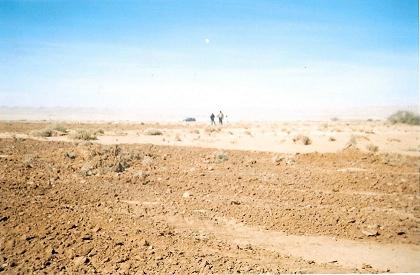
Djanan
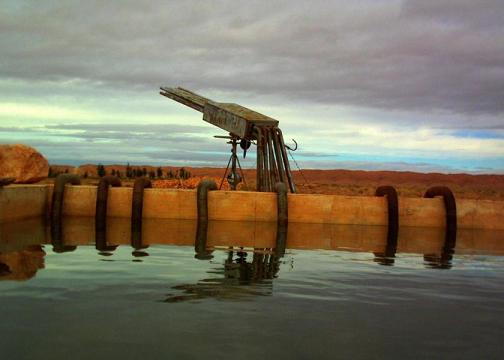 Sky-Acupuncture with Cloud Buster
Sky-Acupuncture with Cloud Buster
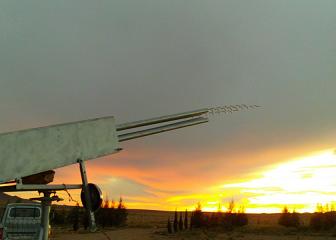 Rain is coming
Rain is coming
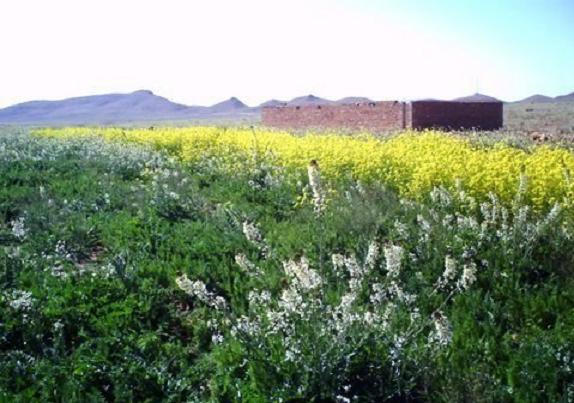
to be continued...
Djanan 2003

Djanan 2009

This thread will probably soon disappear into the void, but let it be an inspiration for the brief moment you're reading and hopefully, enjoying it.
"Be like salad, carry your heart in your head." - Madjid Abdellaziz
How it begins:
Madjid Abdellaziz, born in Algeria, had studied informatics in the 1980s at the Technical University in Berlin/Germany. After he graduated, he worked for Volkswagen as a project manager and programmer.
Being quite successful in Germany, he still had strong ties to his home country.
Shortly before the civil war in Algeria in 1992, he got in contact with a Tuareg Leader, they developed a close relationship and eventually became friends. To help him survive the violent conflicts, he managed to bring him and members of the tuareg tribe to the international tourism fair in Berlin.
After they had returned to Algeria, with the support of both goverments, german institutions organized an expedition to the algerian northern sahara.
It was there, where the defining moment took place, that ultimately changed the course of Madjids life.
The Helicopter, transporting the members of the expedition, crashed during a stop in the desert.
Because Madjid had decided to stay behind to clean up the camp, he hadn't been on the flight.
All occupants died, including the pilot's children.
Madjid, being the only surviver, started to seek for a way to show his gratitude for the life that had been granted to him.
He felt, this experience had given him the obligation to give life back to the desert and to the people living there.
Getting in touch:
In the following years he got in touch with a number of extraordinary scientists, one of them, Prof.Bernd Senf, introduced him to a circle of people who were exploring and working with alternative methods and technologies to revitalize drought-striken areas or deserts in general.
Their research was primarily based on the work of Wilhelm Reich, Victor Schauberger and Nicola Tesla.
The philosophy behind their work, especially Reich's idea of a primordial cosmic energy, was that illnesses and diseases, no matter if in animals, humans or nature itself, were the result of imbalances or blockages and there is no fundamental difference healing a person or a landscape.
In the winter of 1996/97 Madjid undertook with Bernd Senf a first two-week expedition to the Tassili n `Adjjer in the Sahara, to explore the possibilities of a separate project. Madjid had been able to open some doors in the former Algerian government, and the joint projects took shape. Bernd Senf, DeMeo and Madjid then had already written a memorandum on desert vegetation. For August 1999, a second expedition was planned - this time next to Bernd Senf also James DeMeo should be participating - an American scientist who had worked with Wilhelm Reich's technology on major droughts in Namibia 1992/93 and Eritrea in 1994 that he successfully put to an end.
But the unrest in Algeria flared up again and James DeMeo cancelled his trip. Despite the political upheavals in Algeria, the support of the government broke off, Madjid brought on himself alone a few small projects in progress. With the knowledge and technology of Daniel Plochers Penergetics, he built the first "esoteric treatment plant" ( a water purification plant ) - as they named the child at that time - for 20,000 inhabitants in Zeralda in Algiers. It works perfectly to this day without electricity or energy intake. This enabled the locals to again bathe without risk of infection. But the dream of his own landscaping project had to be buried for the time being, given the disastrous political situation.

Djanan
In 2003 Algeria was hit by an extreme drought, as a few other mediterranean countries. The Algerian government considered importing water by tanker. "You cannot just sit idle," said Madjid's wife. But there was no support from the Algerian government, no money, no mission. "But you still cannot sit idle," she said. There was no legal basis. The civil war was in the last breath and to travel with a device over land that looks like an anti-aircraft gun would have been perhaps a stylish way to commit suicide. "But you cannot just ...". she swept Madjid doubt off the table: "Even if the operation is successful only 1% already a lot will be achieved."

It was madness. But it was doable. It was the desert that had given a second life to Madjid Abdellaziz, now he had to return to it. The family bought land in 2004 in a remote area near the formation Djebel Amour, close to the birthplace of his wife, surrounded by cliffs, accessible only by two cuts in the rock canyons. The area was easy to control and could hardly been seen from the outside.The land was owned by the government and was administered by local government in El Haouita, and traditionally used for grazing by the local nomads with their goats and sheep.
Madjid built a Cloud Buster, and some other things that he had learned in Berlin. The weather operation succeeded. After only two and a half hours, the first clouds appeared, after five hours the sky was black and lightning crossed. Half an hour later it was raining.

It was followed by another operation in Djanan. Within a radius of 100 km, the climate returned to normal - it rained so much that the reservoirs were filled to burst soon. It was the end of the Algerian drought. And the beginning of something greater.
Madjid remained in Djanan. With the help of his sister-in-law Fatima and her husband Belami they planted olives, apples, rows of kasuarina trees to stop the wind. He sowed grain, planted potatoes and lettuce. The precipitation remained high - thanks to two clouds stabilizers, which he had installed in the Wadi. It rained so much and so violently that the low areas are partly transformed into lakes, the waters washed away the freshly placed potatoes.
In the first years there were repeated clashes with the nomads, who led their flocks over the newly created fields. Long and tough negotiations were needed with the tribal elders to get them to support the experiment in Djanan
Djanan - as Madjid has dubbed his Garden of Eden - is now in it’s seventh year. The climate in the region has been stable since the first operation 2004. It rains enough, the reservoirs are filled, the water table has increased by 30 meters. The price of desert truffles has dropped from 80 to 8 € per kilo. The people thank Allah in the region - and that's a good thing. Madjid may work in peace.

to be continued...
continued...
Epilog
Up until 2011 Djanan has been a private, mostly self-funded "experiment" and is now open for people, who are interested to participate or create similar projects around the world.
The future goal is to establish a green belt, called the green wave, thru the northern Sahara. A pilot-project in Abu Dhabi, marking the western endpoint, has been launched.
Another operation in Mongolia has been successfully started in the beginning of this year.
For me, the desert greening project acts as symbol, that by utilizing ancient knowledge and the theories and methods of modern thinkers, who tried to expand the boundaries of conventional science, profund differences can be made.
The work of Madjid Abdellaziz and others shows, that compassion and cooperation, with the help non-invasive technologies are the key, to heal the environment and regain the natural balance.
"Be like Salad..."
Desert Greening
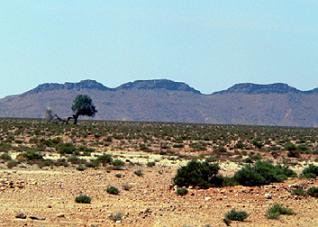 pictures (photographic documentation 2003-2012)
pictures (photographic documentation 2003-2012)
Wilhelm Reich
Viktor Schauberger
Epilog
Up until 2011 Djanan has been a private, mostly self-funded "experiment" and is now open for people, who are interested to participate or create similar projects around the world.
The future goal is to establish a green belt, called the green wave, thru the northern Sahara. A pilot-project in Abu Dhabi, marking the western endpoint, has been launched.
Another operation in Mongolia has been successfully started in the beginning of this year.
For me, the desert greening project acts as symbol, that by utilizing ancient knowledge and the theories and methods of modern thinkers, who tried to expand the boundaries of conventional science, profund differences can be made.
The work of Madjid Abdellaziz and others shows, that compassion and cooperation, with the help non-invasive technologies are the key, to heal the environment and regain the natural balance.
"Be like Salad..."
Desert Greening

Wilhelm Reich
Viktor Schauberger
edit on 7-9-2012 by talklikeapirat because: .
Thanks for posting this OP - I've never heard of this and it's fascinating! ATS would collapse without intelligent, educational posts such as this
one. S&F!
Just awesome. * Wonder if anyone is looking into this for the drought areas here in the USA. I found another link to this
www.desert-greening.com...
reply to post by SeekingDepth
Thanks a lot, i forgot to put the link in. Star.
Most information about this can only be found in german or some french news articles. I wanted to share this with the english speaking members and i'm honestly, truly hoping, someone will be inspired enough to try something similar in the US or Australia, lots of deserts there too.
Maybe they gonna post it here, that would be cool.
Thanks a lot, i forgot to put the link in. Star.
Most information about this can only be found in german or some french news articles. I wanted to share this with the english speaking members and i'm honestly, truly hoping, someone will be inspired enough to try something similar in the US or Australia, lots of deserts there too.
Maybe they gonna post it here, that would be cool.
new topics
-
A Merry Christmas.
Other Current Events: 6 hours ago
top topics
-
Cold Blooded Killers on Christmas!! GRRRRrrr!!
Pets: 13 hours ago, 10 flags -
A Merry Christmas.
Other Current Events: 6 hours ago, 6 flags
8
